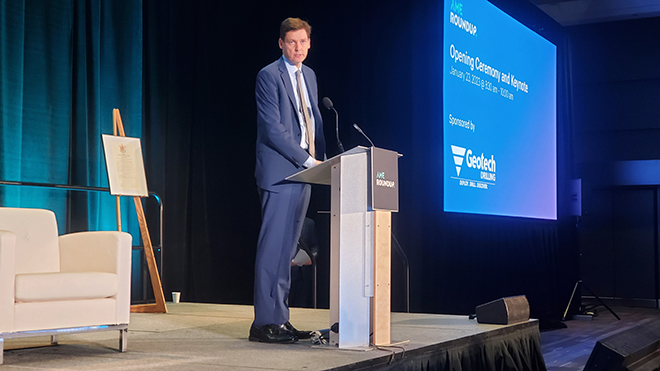Featured Topics
Featured Products
Events
S&P Global Offerings
Featured Topics
Featured Products
Events
S&P Global Offerings
Featured Topics
Featured Products
Events
S&P Global Offerings
Featured Topics
Featured Products
Events
Financial and Market intelligence
Fundamental & Alternative Datasets
Government & Defense
Professional Services
Banking & Capital Markets
Economy & Finance
Energy Transition & Sustainability
Technology & Innovation
Podcasts & Newsletters
Financial and Market intelligence
Fundamental & Alternative Datasets
Government & Defense
Professional Services
Banking & Capital Markets
Economy & Finance
Energy Transition & Sustainability
Technology & Innovation
Podcasts & Newsletters
23 Jan, 2025
By Kip Keen

| David Eby, the premier of British Columbia, said he fully supports Canadian retaliation against possible US tariffs. Source: S&P Global Commodity Insights. |
US dependence on Canadian minerals will bolster Canada's position in negotiations over US President Donald Trump's proposed tariffs, said David Eby, premier of British Columbia.
Eby underscored minerals as key to Canada's retaliation plans and flagged the western province of British Columbia as a crucial source for certain metals and metalloids such as germanium. The premier also said Canada should target trade with Republican jurisdictions and that the threat of tariffs was driving a push to diversify trade away from the US.
"One of the key advantages we have in this fight is materials that Americans can't get anywhere else," Eby said during a Jan. 23 speech at the Association for Mineral Exploration Roundup conference in Vancouver, British Columbia.
The Canadian government has not telegraphed the specifics of its countermeasures playbook to the public. But government officials have met with provincial premiers and Prime Minister Justin Trudeau has huddled with federal ministers to sketch out possible retaliatory tariffs, among other tools.
Trudeau has also underscored US dependence on Canada for energy and minerals, without saying how the country might target trade in those products to counter possible US tariffs. Trump has said that 25% tariffs on all imports from Canada and Mexico may go into effect as of Feb. 1.
Hinting at possible targets, Eby singled out British Columbia's production of germanium from Teck Resources Ltd. operations. The company produces germanium at its Trail plant in the province, as a byproduct of its Red Dog zinc mining operations in Alaska. Germanium is a metalloid that is used in various applications including fiber optics.
Canada is one of the few sources of germanium outside of China, which banned exports of certain commodities including germanium to the US in December 2024.
If the US can't get germanium from Canada, "it can't get it from anywhere," Eby said.
The comment echoed similar remarks made by Trudeau in defining a hardball strategy to respond to US tariffs, which could hit the Canadian economy hard. About three-quarters of Canadian exports head to the US, which in turn counts Canada as a key trading partner.
Eby plans to visit Washington, DC, with other premiers to press Canada's case against US tariffs, the premier said, noting that he had spoken with governors on the West Coast about support.
British Columbia asked "for their assistance, in reaching out to business leaders so that all Americans understand everything from the cost of pasta, to the cost of gas, to the cost of housing is going to go up when these tariffs are in place," Eby said.
The premier said British Columbia fully supports the federal government's plans to levy counter tariffs if Trump goes ahead with the 25% tax on Canadian imports. Trade measures should target Republican jurisdictions in particular "to encourage those key decision makers, on who the president relies for assistance to pass his bills, to remind them of the close connection that we share with the United States," Eby said.
More broadly, the threat of tariffs is driving Canadian leaders to talk about the need to diversify trade away from the US. That will be tough given Canada's dependence on the US for trade and the countries' tightly woven supply chains in sectors including vehicle manufacturing and energy.
However, Eby said US protectionism was galvanizing British Columbia to seek shelter in trade with countries in the same situation.
"We are taking advantage of all the trade opportunities represented by other countries that have also been hit by American actions," Eby said, pointing to Japan and the Biden administration's recent decision to block Nippon Steel Corp.'s takeover of U.S. Steel Corp.
"As other countries are hit by these tariffs, we'll have more and more partners that are seeking to develop relationships with Canada," Eby said.
The premier was not available to take questions.